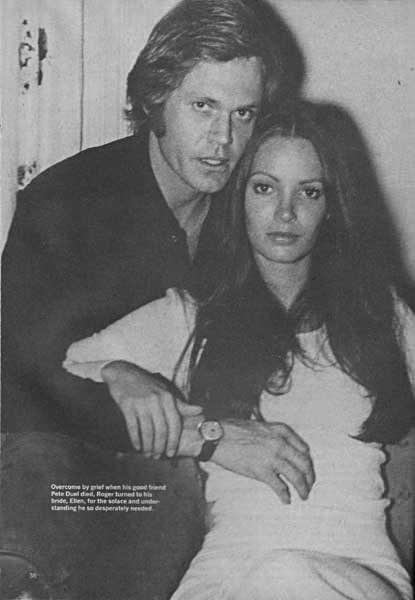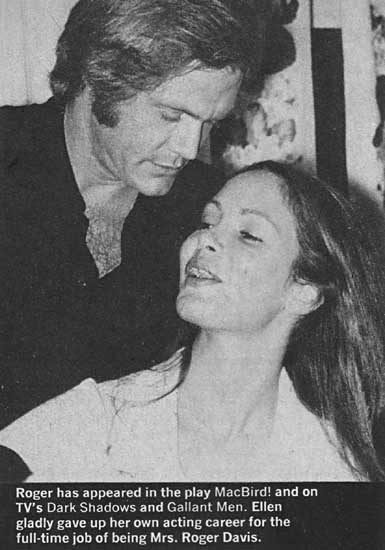by Suzzana Del Lobo
 Hollywood hurt Roger Davis more deeply than anyone
guessed. Now, at last, he can tell his shocking story:
Hollywood hurt Roger Davis more deeply than anyone
guessed. Now, at last, he can tell his shocking story:
 Hollywood hurt Roger Davis more deeply than anyone
guessed. Now, at last, he can tell his shocking story:
Hollywood hurt Roger Davis more deeply than anyone
guessed. Now, at last, he can tell his shocking story:
Roger Davis is a tall, slim, trim young man with a winning grin...and one of TV's toughest acting assignments behind him. For it was Roger who was called upon to replace Peter Duel in the now defunct series, Alias Smith and Jones.
No man ever had a more difficult job, for Pete's sudden, horrible death gave all Hollywood a severe jolt. The biggest shock of all was felt among the cast and crew at Universal Studios, where Pete had been expected to show up for a hard day's work on the last day of 1971.
It didn't happen that way. Instead, in the very early hours of that morning, everyone involved was notified that Pete had been found dead from an apparently self-inflicted gunshot wound in the head. He would not be coming to work. He would never be going anywhere under his own power again. Most especially he would not be smiling and joking his way through each week's episodes of Alias Smith and Jones.
However, in the long-established tradition of show business, the series must go on. Or did it have to go on? That was the question. It was a decision which had to be made almost instantly--within a day of Pete's death. The show's production had to fit, if it were to be done at all, within the tight demands of the network's schedule.
Meanwhile, all contingencies must be provided for. And thus it was at about 10 o'clock that same morning that the telephone rang in Roger Davis' room in an Aspen, Colorado lodge. He'd planned a New Year's holiday weekend with his wife. They were just going to rest and get away from it all.
That, too, was not to be. The telephone call was from Universal, which at that point didn't have any answers at all in relation to the continuance of the series. The studio executives simply asked Davis if he would return to Hollywood immediately, cancel the rest of his holiday, and stand by.
"That's all I heard," Roger said recently when I had lunch with him. "Just would I stand by, and I said of course I would."
 "By
the time I got back in town," Roger related, "studio
executives had decided the show would continue; that Pete would
be replaced--and that Roger Davis was to be the replacement! All
those decisions had been made by six o'clock that night."
"By
the time I got back in town," Roger related, "studio
executives had decided the show would continue; that Pete would
be replaced--and that Roger Davis was to be the replacement! All
those decisions had been made by six o'clock that night."
No man ever had a sadder, more difficult New Year's Eve than Roger did. He was still trying to assimilate the awful fact of his friend's (and Davis and Duel were friends) death. It was made even harder by the fact that Roger simply was given no time to get his emotions together in private. The series had to begin filming again on the following Monday.
Naturally besieged as it was by reporters from all over the country, the studio instantly announced its decision and the name of the new cast member. It was all very straightforward--and very tragic. But it was done with the most commendable professionalism and nobody could take exception to that.
Oh, no? Hardly had Davis walked on the set his first time before a columnist sniped, "Roger Davis was in wardrobe before poor Pete Duel's body was cold."
That one really hurt Davis. It still hurts. So much so that even the slightest reference to it makes his voice roughen with resentment. It was bitterly unfair to everyone. But Davis, also a professional in the highest sense of that term, was determined not to let it interfere with what he, too, had to do. And what he had to do was probably the hardest--re-do some scenes already filmed by Pete.
That almost broke up the entire production unit. For, in order to get what is called a "match", the previous Duel film had to be run over and over and over. Again and again they had to see Pete smiling, riding, quipping. More than once, everything had to stop while somebody regained control.
Into all this horror and shock and sorrow walked Roger Davis. "I never saw a man handle himself with such sensitivity and correctness in all my life," a studio official commented a few days later. "Roger just came on very quietly, followed directions and kept a circumspect distance otherwise. He was friendly, but he didn't push. If he had, the whole thing would have been a complete mess. As it was, he kept himself and everybody else together."
Roger's first episode was finally filmed and aired. That was another crisis time. Would the viewing audience accept Roger? After all, who was this Roger Davis?
 Roger
was born in Kentucky and grew up there. Following high school
graduation he went to Columbia University in New York City. Following
graduate from Columbia, he was accepted at Harvard Law School.
He enrolled, and left one week later, when he received a teaching
fellowship at the University of California at Los Angeles. He
got his M.A. there and was teaching freshman English when he decided
to quit and become an actor, after being offered his first TV
role, a part in the short-lived series The Gallant Men.
Roger
was born in Kentucky and grew up there. Following high school
graduation he went to Columbia University in New York City. Following
graduate from Columbia, he was accepted at Harvard Law School.
He enrolled, and left one week later, when he received a teaching
fellowship at the University of California at Los Angeles. He
got his M.A. there and was teaching freshman English when he decided
to quit and become an actor, after being offered his first TV
role, a part in the short-lived series The Gallant Men.
After the series went under Roger was in the satiric Broadway show entitled MacBird, which needled the Lyndon Johnson administration harshly. He portrayed the character based on Robert Kennedy.
Roger was in MacBird for just over a year, until he was offered the part in Dark Shadows. During his stint on the series, he also made a lot of commercials--which is how he met his wife.
"My wife, Ellen, did a lot of commercials, too," Roger explained, "and we had the same agent for them in New York. Well, one day I was in for an interview; she had left, but was detained in the hall by a fellow with whom I had gone to college. He introduced us, and naturally I asked her out. And that did it. We were married a month and a half later!"
That was six years ago, and one of those
is a year Roger will never be able to forget. Alias Smith and
Jones has been off the air for some time now, but Roger Davis
will always remember the day he was asked to take over a dead
man's identity. Roger knew if he didn't accept the offer to play
Pete Duel's part the series might be canceled. And he was close
enough to Peter in real life to know Peter would have wanted the
series to continue. It was a hard decision for Roger to make,
but once he had, he knew he had made the right one--for himself...and
for his dead friend.
Back to Articles List